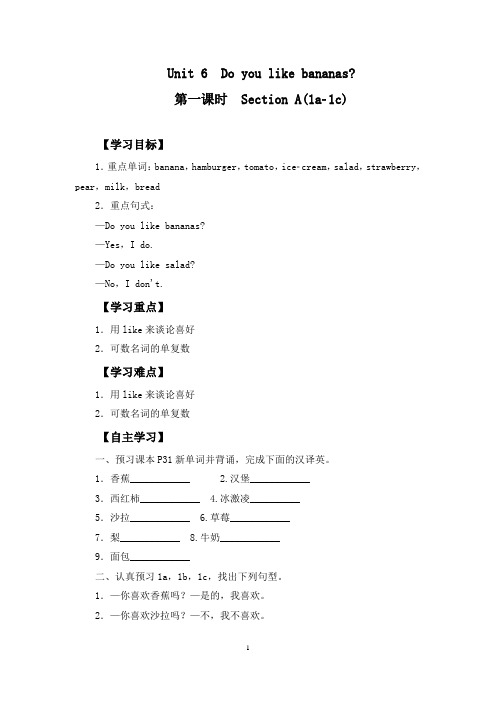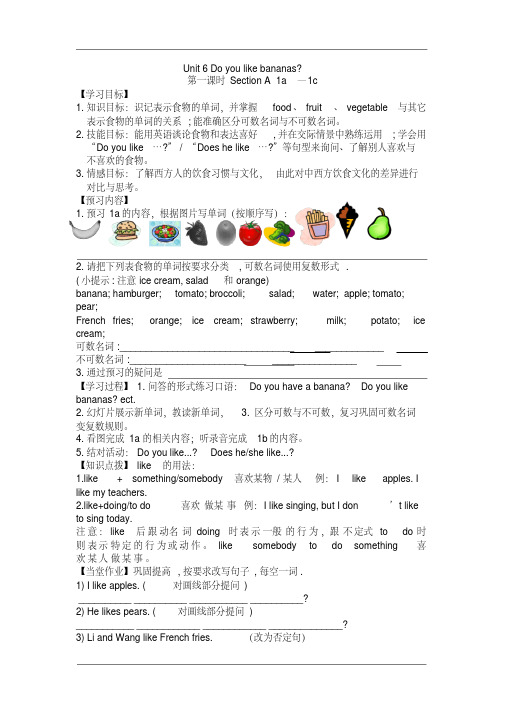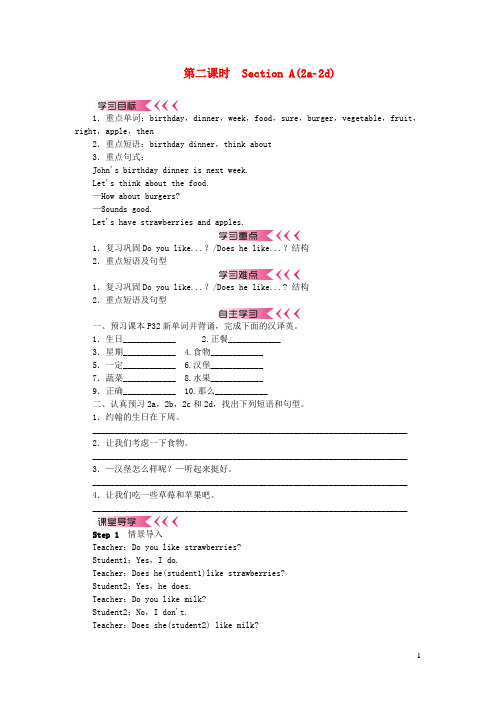Do you like bananas .Section A 2
七年级英语上册 Unit 6 Do you like bananas?Section A(1a2d)

?
答案: ①have/eat dinner ②have/eat breakfast
第二十一页,共24页。
Ⅰ. 用所给词的适当形式(xíngshì)填空
1. —
you
(like) hamburgers?
—Yes, I do. I like them very much.
2. Let’s
(go) to school with Li Lin and Wang Mei.
5. tomatoes
第二十二页,共24页。
Ⅱ. 单项选择(xuǎnzé)
1. Look! Some bread
in the bag and some apples
on
the table.
A. is; is
B. is; are
C. are; is
D. are; are
2. These are
burgers.
第十五页,共24页。
【自主归纳】以-o结尾加-es的可数名词 以-o结尾加-es的可数名词主要(zhǔyào)有以下几个:
Negro→Negroes黑人 hero→heroes英雄 potato→potatoes土豆 tomato→tomatoes西红柿
可用一句顺口溜记住: 黑人英雄爱吃土豆和西红柿。
*We have English at eight on Monday. 我们在周一八点上英语课。 *They will have a meeting tomorrow. 他们明天要开会。
第二十页,共24页。
【学以致用】
①让我们(wǒ men)吃晚饭吧。
Let’s
.
②你们什么时候吃早饭?
What time do you
【精选】人教版七年级上册英语Unit6第六单元优秀教案

Unit 6 Do you like bananas?第一课时Section A(1a1c)【学习目标】1.重点单词:banana,hamburger,tomato,icecream,salad,strawberry,pear,milk,bread2.重点句式:—Do you like bananas?—Yes,I do.—Do you like salad?—No,I don't.【学习重点】1.用like来谈论喜好2.可数名词的单复数【学习难点】1.用like来谈论喜好2.可数名词的单复数【自主学习】一、预习课本P31新单词并背诵,完成下面的汉译英。
1.香蕉____________ 2.汉堡____________3.西红柿____________ 4.冰激凌__________5.沙拉____________ 6.草莓____________7.梨____________ 8.牛奶____________9.面包____________二、认真预习1a,1b,1c,找出下列句型。
1.—你喜欢香蕉吗?—是的,我喜欢。
2.—你喜欢沙拉吗?—不,我不喜欢。
【课堂导学】Step 1情景导入Teacher:There are many different kinds of fruits and vegetables in the world,and different people like different food.Everyone has its own taste.What kind of food do you like?What kind of food do you dislike?Today let's talk about the food we like and we dislike in Unit 6.环节说明:由学生感兴趣的话题导入新课,简洁明了,激起学生的学习兴趣。
人教新目标英语七上Unit6Doyoulikebananas教案4

Unit 6 Do you like bananas?第一课时Section A 1a—1c【学习目标】1.知识目标:识记表示食物的单词,并掌握food、 fruit、 vegetable与其它表示食物的单词的关系;能准确区分可数名词与不可数名词。
2.技能目标:能用英语谈论食物和表达喜好,并在交际情景中熟练运用;学会用“Do you like…?” /“Does he like…?”等句型来询问、了解别人喜欢与不喜欢的食物。
3.情感目标:了解西方人的饮食习惯与文化,由此对中西方饮食文化的差异进行对比与思考。
【预习内容】1.预习1a的内容,根据图片写单词(按顺序写):2.请把下列表食物的单词按要求分类,可数名词使用复数形式.(小提示:注意ice cream, salad和orange)banana; hamburger; tomato; broccoli; salad; water; apple; tomato; pear;French fries; orange; ice cream; strawberry; milk; potato; ice cream;可数名词:_________________________________ _____________不可数名词:______________________ ________________3.通过预习的疑问是【学习过程】1.问答的形式练习口语:Do you have a banana? Do you like bananas? ect.2.幻灯片展示新单词,教读新单词,3.区分可数与不可数,复习巩固可数名词变复数规则。
4.看图完成1a的相关内容;听录音完成1b的内容。
5.结对活动:Do you like...? Does he/she like...?【知识点拨】like 的用法:1.like + something/somebody 喜欢某物/某人例:I like apples. I like my teachers.2.like+doing/to do喜欢做某事例:I like singing, but I don’t like to sing today.注意:like后跟动名词doing时表示一般的行为,跟不定式to do时则表示特定的行为或动作。
(英语周报)七年级英语Unit6-Do-you-like-bananas-Section-A-2

IV. Exercise
一. 按要求写出下列单词 1. watch(复数)_w__a_tc_h_e_s_ 2. carrot(复数)__c_a_r_ro_t_s_ 3. sound(第三人称单数)___s_o_u_n_ds 4. tomato(复数)_t_o_m__a_to_e_s
不可数名词。当可数名词时, 意思是 “橘子”;当不可数名词时,意思是橘汁。 如:Can I have an orange juice, please?
我可以要一杯橘汁吗? I like oranges better than tomatoes.
与西红柿比,我比较喜欢橘子。
第13页,共19页。
3. I like bananas. 我喜欢香蕉。
第5页,共19页。
Do you like hamburgers? they
Tom and Sally
Yes, I / they do. No, I / they don’t.
第6页,共19页。
What does she like? Does she like…
第7页,共19页。
Does she like ice cream? he your sister his father
(1) like表示“喜欢”, 是动词。如果主语是 第 三人称单数, 后要加“s”。例如: He likes apples. 他喜欢苹果。
(2) 否定形式要在like前加don’t或在likes 前加doesn’t, 同时把likes改为like。 I don’t like bananas. 我不喜欢香蕉。 He doesn’t like apples. 他不喜欢苹果。
1. Copy the new words. 2. Finish off the exercises on 3A 3. Ask your parents about the food in this
七年级人教版英语上册Unit6Doyoulikebananas?全单元教案

Unit 6Do you like bananas?Period 1(Section A 1a-1c)Teaching aims1. Learn words and be able to say, read and write them:orange(s), banana(s), strawberry, strawberries, pear(s), apple(s),tomato(es), carrot(s), vegetable(s), hamburger(s), egg(s), ice-cream(s),salad(s), bread, chicken2. Be able to talk about likes and dislikes by using:I/We/They like oranges. He/She likes oranges.I /We/They don’t likebananas. He/She doesn’t like hamburgers.Do you like salad? Yes, I do./No, I don’t.Does he/she like tomatoes? Yes, he/she does. / No, he/she doesn’t.3.Understand the difference between countable nouns and uncountable nouns.Teaching key and difficult points:1.Learn these words and be able to say, read and write them:2.Be able to talk about likes and dislikes by using:I/We/They like oranges. He/She likes oranges.I /We/They don’t likebananas. He/She doesn’t like hamburgers.Do you like salad? Yes, I do./No, I don’t.Does he/she like tomatoes? Yes, he/she does. / No, he/she doesn’t. Moral objects(1)To call students ’ attention to otherserests and’ei n ablet themto care more about classmates.(2)To improve Sts ’communicating skills and enable them to keeptheir health.教学设计备注Step 1. Warm-up and revision(1)Daily greeting to the students(2)Revision: What ’s this/that in English ? What coloris it?T:What ’s this in English? (show a picture of andorange)T:What color is it?Step 2. Presentation –New words.(1)Go on asking: What ’s this/that in English ? Whatcolor is it?T:What ’s this in English? (show a picture of anapple and if the student don’t know it, show thephonetic symbol of the word.)T: Spell it, please.S: A-P-P-L-E.T: What color is it?S: It ’s red.(Present the other three words as above: pear,strawberry, banana )T:We can call all of these things fruit . (Teach the newword “fruit ”.)Show pictures and ask the Ss “What arethese/those? ”and ask the SS to spell the pluralforms of these words: oranges, apples, pears,strawberries, bananas.(2)Repeat step (1) to present: carrot, carrots,tomato, tomatoes and vegetable, vegetables.(3)Present some more words by showing pictures. Get theSs to make an effort to pro nounce and spell the new words.Bread, hamburger ,hamburgers, milk, ice-cream,ice-creams, salad, chicken ,an egg, eggsWe can call all of these things food:食物3.Memory Challenge: Who has the best eyes?(1)Show the pictures, and say the plural forms of the nouns andsome uncountable noun.(2)Summarize. 可数名词有复数形式 , 不可数名词一般没有复数形式Step 3Presentation Target language 11. Show the pictures and say:I like tomatoes, but I don’ t like bread.2.Let students say:I like, but I don’t like ....3. Show the pictures and say:She likes bread, but she doesn’t like milk.He likes chicken, but he doesn’t like eggs.4.Let students say: He/She likes , but he/she doesn’tlike ....According Ss’answers and say:5. Sing a chant:Bananas, bananas, I like bananas! Salad, salad, I like salad!Strawberries, strawberries,I don ’t like strawberries!Pears, pears, he likes pears!Milk , milk, he likes milk!Tomatoes, tomatoes,He doesn ’t like tomatoes! Step 4 Work 1a .1. Read the words.2.T: Look at the pictures and fill in the chart .Fruit Food Vegetable3.Match the words with the things in the picture.4.Check the answers .Step 5 Present the new language 1 .1. T: Oh, we have lots of delicious fruits . I like apples best.Do you like apples ?S1 :Yes , I do. I like apples.S2: No, I don't . I like salad.T: Do you like salad ? S3: Yes , I do. I like salad./ No, I don't . I don’tlike salad.Step 6 Pairwork .1. T: Work in pairs .Ask and answer with your partners .(Before class the students have draw some pictures of the food )2. Get the Ss to ask and answer in pairs, using the sentences:’t.A: Do you like ?B: Yes, I do./ No, I don 3. When you ask andanswer, please fill in the chart. Name Like DislikeStep 7 Present the new language 2 .1.Show pictures and ask and answer questionsDoes she/he like ?Yes, she/he does. She/He likes/ No, she/he doesn ’t. She/He doesn ’tlike .Step 8 Pairwork .1. T: Work in pairs .Ask and answer with your partners .2.Get the Ss to ask and answer in pairs, using the sentences:Does she/he like ?Yes, she/he does. She/He likes/ No, she/he doesn ’t. She/He doesn ’tlike .3.According Ss’answers and ask “Do they like ? Yes, they do./ No, they don’t.”Step 9 Work on 1b.1.T: 1b. List en and number the conversations.2.Listen.3.Check the answers.4.Read after the tape.Step 10 work on 1c.1.First, practice the conversations in 1b.Then, make a survey and fill in the chart below.2. Report: I like milk and tomatoes, but I don’t like ice-cream. Mary likes oranges, but she doesn’liket milk orice-cream. Tom likes tomatoes and strawberries, but hedoesn ’ t like bread.Step 11 . HomeworkWrite down the report.Blackboard design:New Words Unit 6 Do you like bananas?Do you like?Yes , I do. I likeNo ,I don ’t. I don ’tlikeDoes she/he like ?Yes, she/he does. She/He likes/No, she/he doesn ’t. She/He doesn ’tlike.Period 2(Section A 2a-2d)Teaching aims:1. Words & expressionsBirthday, dinner, week, think about, food, sure, how/whatabout ? Burger, vegetable, fruit, apple, then2. Target languageI like strawberries, they’re delicious. Let’s have them.--Yes, I like them ,too./ No, I don’tlike them.I like salad, it ’s delicious. Do you like it?-- Yes, I do./No, I don’t but I likeice cream.Let ’ s have Let ’s think about the food.Ability goalsEnable students to talk about likes and dislikes.Learning ability goalsHelp students learn how to talk about likes and dislikes.2. Listening and speaking skills.Moral object:Learn to keep healthy.Teaching important / difficult pointsHow to talk about likes and dislikes with the target language.教学设计备注Step1 Warm up and revision.1.Everyday greeting.2.Review.Show the pictures and say the singularforms and the plural forms of the countable nouns.3.Show some pictures of the uncountable nouns.4.Summarize.(1).当可数名词复数再次出现时,用“They( 主语)或 them(宾语)”替代。
英德市第五中学七年级英语上册Unit6Doyoulikebananas第二课时SectionA2a_

第二课时Section A(2a2d)1.重点单词:birthday,dinner,week,food,sure,burger,vegetable,fruit,right,apple,then2.重点短语:birthday dinner,think about3.重点句式:John's birthday dinner is next week.Let's think about the food.—How about burgers?—Sounds good.Let's have strawberries and apples.1.复习巩固Do you like...?/Does he like...?结构2.重点短语及句型1.复习巩固Do you like...?/Does he like...? 结构2.重点短语及句型一、预习课本P32新单词并背诵,完成下面的汉译英。
1.生日____________ 2.正餐____________3.星期____________ 4.食物____________5.一定____________ 6.汉堡____________7.蔬菜____________ 8.水果____________9.正确____________ 10.那么____________二、认真预习2a,2b,2c和2d,找出下列短语和句型。
1.约翰的生日在下周。
________________________________________________________________________ 2.让我们考虑一下食物。
________________________________________________________________________ 3.—汉堡怎么样呢?—听起来挺好。
________________________________________________________________________ 4.让我们吃一些草莓和苹果吧。
七年级英语上册 Unit 6 Do you like bananas(第1课时)Section A(1a-2d)课件 (新版)人教新目标版

some意为“一些”。用于修饰可数名词复数以 及不可数名词。 一般用于肯定句中。
She has some nice skirts.她有一些好看的裙子。
(1)通常情况下, 在否定句和疑问句中, 要将some改为any 。
Do you have any milk?你有牛奶吗?
后面可以接very much, a lot, a little, not…at all 等表程度的词。
Jerry likes Chinese food very much. 杰里非常喜欢中国的食物。
like还可作介词,意为“像”。 一般位于be动词或其他动词之后 。like后接名词或代词作宾语。
The girl looks like her father. 这女孩长得像她爸爸。
bananas
2b Listen again. Fill in the blanks.
hamburgers
tomatoes
ice-cream ice-cream
tomatoes
2c Practice the conversations above. Give answers
that are true for you.
1.Do you like bananas?你喜欢香蕉吗?
询问某人的喜好,常用句型:Do/Does+主语+ like+…? 意思是“某人喜欢……吗?”
肯定回答用:Yes,主语+ do/does; 否定回答用:No,主语+don’t/doesn’t.
like是及物动词,意为“喜欢”。 like +sb. /sth. /doing sth. /to do sth. 意为“喜欢某人/某物/做某事”。
人教版七年级英语上册Unit6Doyoulikebananas教案

人教版七年级英语上册Unit6 Do you like bananas教课设计课题Unit 6 Section A 1a /1b /1c /2a /2b.课型New一、知识与技术:1)单词:do,don ’ t,does,doesn’ t,strawberries,like,have,bamburgers,orange,tomatoes,icecream,broccoli,salad,French fries, bananas.2)句型: Do you like bananas?教课目的Yes, I do. \ No, I don’ t.经过学习本课,学生能够用英语相互议论喜爱与不喜爱的食品。
二、过程与方法:1)睁开多种任务型的听力活动,获取理解、辨别和办理与讨论爱好、憎恶有关的信息。
2)经过小组议论、睁开检查等研究,明确在用中学、沟通中学习的想法。
三、感情态度价值观:议论美食,享受生活美味,倡导健康合理饮食。
教课要点掌握对于食品的词汇。
教课难点学会使用社交用语 Do you like bananas? Yes,I do.\ No, Idon ’ t.课前准备录音机、多媒体课件教课过程:设计企图Step1. Warming upStep 2 Presentation经过让学生猜冰箱里有哪些食品的形式,导出新的单词。
同时让全体学生拼读每个单词、让个别学生将单词写到黑板上。
Step3.Task 1部署一项任务:老师手持一个盒子, 让同学猜猜老师最喜爱的食品.规则为学生只好问老师问题而老师只用“Yes”或“No”回答。
达成 Section A, 1a, 1b.Step 4. Task 2部署拓展性任务:要求同桌学生合作编一个小型对话,主题为咨询他人喜爱或不喜爱的食品。
要求使用刚学过的食品类单词以及句型,同时也能够适合地加入课外单词(老师请一程度较好的学生先进行示范)。
Step 5.达成课文32 页 Section A 听力练习activity 2a, 2b.Setp 6.当堂听写听写单词与句型,进一步稳固本课学习内容,并将本课应掌握的单词和句型落实到“写”上,使学生不只会说同时会写。
- 1、下载文档前请自行甄别文档内容的完整性,平台不提供额外的编辑、内容补充、找答案等附加服务。
- 2、"仅部分预览"的文档,不可在线预览部分如存在完整性等问题,可反馈申请退款(可完整预览的文档不适用该条件!)。
- 3、如文档侵犯您的权益,请联系客服反馈,我们会尽快为您处理(人工客服工作时间:9:00-18:30)。
Let have burgers and some fruit. ______________________________
Do you like …?
Ask and answer.
Yes, I do. / No, I don’t.
Let’s have … ?
Sounds good. / No, I don’t like ___.
Role-play the conversation in 2d. Jack: Hey, John’s birthday dinner is next week. Let’s think about the food. Tom: Sure. How about burgers, vegetable salad, and some fruit. Bill: Sounds good. John likes hamburgers. Jack: Oh, I don’t like salad.
4 OK.
D: OK.
Ask your classmates about the food in the chart. Find out what they like and don’t like. Do you like ice-cream, Liu Li? Yes, I do. Do you like ice-cream, Zhang Jun? No, I don’t.
uncountable nouns
milk
tea
meat
water
bread
rice
可数名词和不可数名词
既可数又不可数名词
定义:在某些情况下能计数,在某些情况下 不能计数的名词。 e.g. (1) a chicken 一只鸡 chicken 鸡肉 (2) an ice cream 一个冰淇淋 ice cream 冰淇淋(指成份)
4. We (likes / like) hamburgers, but we (don’t / doesn’t) like chicken. 5. They (likes / like) pears, but they (don’t / doesn’t) like strawberries.
第三人称复数形式
Bill: But John likes salad, and it’s his birthday. Jack: Yes, you’re right. What about the fruit? Tom: I think John likes strawberries and apples. Bill: OK. Let’s have strawberries and apples then.
food
fruit
ice-cream salad chicken
可数名词和不可数名词 可数名词 定义:是可以计数的名词。 ( 1) ( 2) 可数名词前可以用 a, an 限定, 表一 个….。 (3)可数名词前可以用 one, two, three … 限定。 ( 4) 可数名词有复数形式。
可数名词复数形式的构成 1
(3) a salad 一碟沙拉 salad 沙拉(指成份)
countable and uncountable nouns
ice-cream
salad
chicken
3a
Underline the correct words in the brackets.
1. I like fruit, but I (don’t / doesn’t) like vegetables. 2. She (like / likes) bread, but she (doesn’t / don’t) like salad. 第三人称单数形式 3. He (like / likes) bananas, but he (don’t / doesn’t) like oranges.
7. His cousins don’t ________ like (not like) ice-cream. 二、 根据汉语提示写单词。
1. Ms Sun like _________ vegetable (蔬菜) very much.
2. We always have ______ dinner (晚饭) at 6:00.
词尾 加法
词尾读音方法
例词
加-s -es读[iz] 加-es
oranges
boxes watches knives
wives
改f或 fe为 v 再 加 -es
-ves读[vz]
可数名词复数形式的构成 2
名词特点 词尾加法 词尾读音方法 例词 families dictionaries
以辅音字母 改y为i 加y结尾的 再加-es 以元音字母 加-s 加y结尾的
一、重点句型
1. 你喜欢色拉吗? Do you ____ like salad? ____ 2. 是的。____, Yes I ____. do No I ______. don’t 不,不喜欢。_____, 3. 他们喜欢梨吗? Do _____ they like pears? ____ 4. 是的。Yes ____, they ____. do 不喜欢。___, No they ______. don’t
3b
Number these sentences [1-4] to make a conversation.
3 So, let’s get salad. A: Do you like salad? 2 Yes, I do. B: Yes, I do. 1 Do you like salad? C: So, let’s get salad.
3. strawberry (复数) ___________ strawberries
7. 考虑
think about ___________
8. 听起来不错。
_____________ Sounds good.
9. 怎么样? How about… / What about. __________________________ 10. 让我们吃汉堡和一些水果吧。
Let’s chant:
Apple round, apple red Apple juicy, apple sweet Apple, apple, I love you Apple sweet I love to eat Apple round, apple red Apple juice, apple sweet Apple, apple, I love you Apple sweet I love to eat
9. 我喜欢桔子。我不喜欢香蕉。 like _______. oranges I _____ don’t ____ like bananas. I ____
Countable nouns Uncount- Countable and able uncountable nouns nouns
hamburgers, eggs ___ milk oranges apples bread _______________ bananas pears rice _______________ carrots tomatoes _______________ vegetables _______________ _______________ strawberries
-ies读[iz]
-s读[z]
boys keys
名词特点 词尾加法 词尾读音方法 以o结 尾的
例词
有生命的 事物加-es
无生命的 事物加-s
-es读[z] -s读[z]
tomatoes potatoes photos
radios
可数名词和不可数名词 不可数名词 定义:是指不能计数的名词。 ( 1) 不可数名词前不可以用 a, an 限定。 (2) 不可数名词前不可以用 one, two, ( 3) three … 限定。 不可数名词没有复数形式。 ( 4)
在一般现在时态的句子中: 1. 当句子主语为第三人称单数时,谓语动词 也应用其第三人称单形式,在动词后面 加“-s 或 -es”。 like → likes;have → has 2. 当句子主语为第一人称,第二人称和第三 人称复数形式时,谓语动词用原形形式。
Jack likes apples, but his sister doesn’t like apples. 杰克喜欢苹果,但他的妹妹不喜欢。 We have three pears. They don’t have pears. 我们有三个梨,他们没有梨。
2. Review the Grammar Focus.
一、用所给单词的适当形式填空。
1. I like _________ tomatoes (tomato) very much.
2. Nick _____ likes (like) hamburgers and salad.
3. Let’s ______ think (think) about the birthday
名词特点 一般情 况下 以-s, -x, - 加-s sh, -ch 结 尾的 词尾 加法 词尾读音方法 1. -s在清辅音后读[s] 2. -s在浊辅音后读[z] 3. -s在元音后读[z] 例词
desks apples pears
4. 以音素[ s , z ]结尾 的,读[iz]
名词特点 以 f 或 fe 结尾的
A: Do you like …? B: Yes, I do. / No, I don’t.
Food likes doesn’t like
ice-cream rice oranges
milk salad strawberries tomatoes bananas
